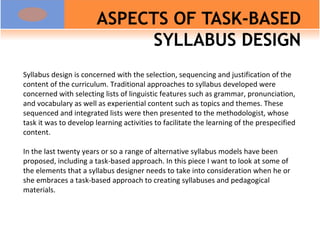
Aspects of task based syllabus design
- 1. ASPECTS OF TASK-BASED SYLLABUS DESIGN Syllabus design is concerned with the selection, sequencing and justification of the content of the curriculum. Traditional approaches to syllabus developed were concerned with selecting lists of linguistic features such as grammar, pronunciation, and vocabulary as well as experiential content such as topics and themes. These sequenced and integrated lists were then presented to the methodologist, whose task it was to develop learning activities to facilitate the learning of the prespecified content. In the last twenty years or so a range of alternative syllabus models have been proposed, including a task-based approach. In this piece I want to look at some of the elements that a syllabus designer needs to take into consideration when he or she embraces a task-based approach to creating syllabuses and pedagogical materials.
- 4. ASPECTS OF TASK-BASED SYLLABUS DESIGN Language Data By language data, I mean samples of spoken and written language. I take it as axiomatic that, without access to data, it is impossible to learn a language. Minimally, all that is needed to acquire a language is access to appropriate samples of aural language in contexts that make transparent the relationship between form, function and use. In language teaching, a contrast is drawn between “authentic” and “non-authentic” data. Authentic data are samples of spoken or written language that have not been specifically written for the purposes of language teaching. “ Non-authentic” data are dialogues and reading passages that HAVE been specially written.
- 6. ASPECTS OF TASK-BASED SYLLABUS DESIGN Practice The third and final essential element is practice . Unless you are extraordinarily gifted as a language learner, it is highly unlikely that you will get very far without extensive practice. In designing practice opportunities for my learners, I distinguish between tasks, exercises and activities. A task is a communicative act that does not usually have a restrictive focus on a single grammatical structure. It also had a non-linguistic outcome. An exercise usually has a restrictive focus on a single language element, and has a linguistic outcome. An activity also has a restrictive focus on one or two language items, but also has a communicative outcome. In that sense, activities have something in common with tasks and something in common with exercises. I distinguish between real-world or target tasks , which are communicative acts that we achieve through language in the world outside the classroom, and pedagogical tasks, which are carried out in the classroom. I subdivide pedagogical tasks into those with a rehearsal rationale and those with a pedagogical rationale.
- 7. TYPES OF TASKS Real-world or target task : A communicative act we achieve through language in the world outside the classroom. Pedagogical tasks : A piece of classroom work which involves learners in comprehending, manipulating, producing or interacting in the language while their attention is principally focused on meaning rather than forms. They have a non-linguistic outcome, and can be divided into rehearsal tasks or activation tasks. Rehearsal task : A piece of classroom work in which learners rehearse, in class, a communicative act they will carry out outside of the class. Activation task : A piece of classroom work involving communicative interaction, but NOT one in which learners will be rehearsing for some out-of-class communication. Rather they are designed to activate the acquisition process. Enabling skills : Mastery of language systems grammar, pronunciation, vocabulary etc. which ENABLE learners to take part in communicative tasks. Language exercise : A piece of classroom work focusing learners on, and involving learners in manipulating some aspect of the linguistic system Communication activity : A piece of classroom work involving a focus on a particular linguistic feature but ALSO involving the genuine exchange of meaning.
- 8. EXAMPLES OF PEDAGOGICAL TASKS, COMMUNICATIVE ACTIVITIES AND LANGUAGE EXERCISES Language exercise Write the past tense form of these verbs: go, is, are, do, have, work, study, buy, pick, make, put, read. Now think of four things you did yesterday. Write sentences in the blanks. First I got up and _____________________________________________ Then, _______________________________________________________ Next, _______________________________________________________ Finally, ______________________________________________________
- 9. COMMUNICATIVE ACTIVITY Write three hobbies or activities you like / like doing. 1. _______________________________________________________ 2. _______________________________________________________ 3. _______________________________________________________ Ask each person in your group what they like / like doing. Decide on a suitable gift for each person.
- 10. PEDAGOGICAL TASK REHEARSAL Write your resume. Now, imagine you’re applying for one of these jobs. Your partner is applying for the other. (Students have two job advertisements) Compare your partner with other applications for the job. Who is the best candidate?
- 11. Pedagogical tasks activation List three things you’re thinking about doing this week: Group work. Tell your partners what you’re thinking about doing. For each activity, get a recommendation and a reason from three different people. Then write the best recommendations in the chart. Activity Recommendation 1. 2. 3. ACTIVITY RECOMENDATIOM 1- 1- 2- 2- 3- 3-
- 14. STEPS TO FOLLOW These are the steps that I follow in designing language programs. 1. Select and sequence real-world / target tasks 2. Create pedagogical tasks (rehearsal / activation) 3. Identify enabling skills: create communicative activities and language exercises 4. Sequence and integrate pedagogical tasks, communicative activities and language exercises